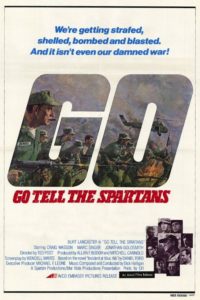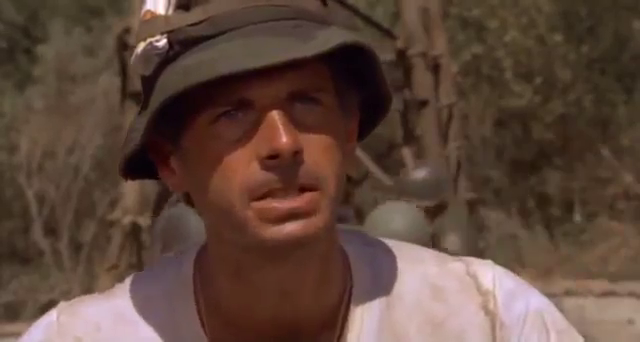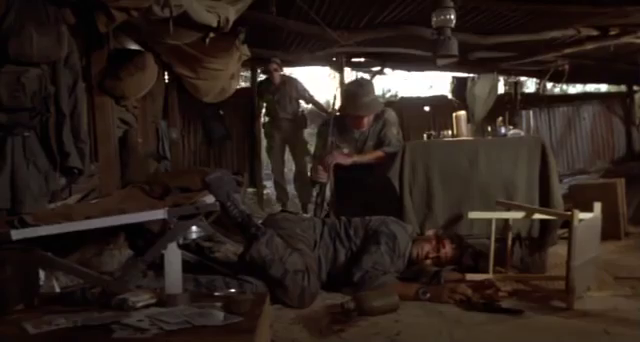|

Synopsis:
During the early years of the Vietnam War, a battle-weary major (Burt Lancaster) and his officer (Marc Singer) at a poorly manned outpost send a group of men — including promotion-hungry Lieutenant Hamilton (Joe Unger), burnt-out Sergeant Oleonowski (Jonathan Goldsmith), drug-addicted medic Corporal Abraham Lincoln (Dennis Howard), demolitions expert Corporal Courcey (Craig Wasson), communications expert Corporal Ackley (John Megna), and a half-Vietnamese translator named Cowboy (Evan Kim), in addition to mercernaries and South Vietnamese troops — to garrison the deserted hamlet of Muc Wa; but their journey is haunted by the ghosts of massacred French soldiers from an earlier conflict.
|
|
Genres, Themes, Actors, and Directors:
- Burt Lancester Films
- Soldiers
- Vietnam War
Response to Peary’s Review:
Peary writes that “the best Vietnam War film” in 1978 — directed in a “surprisingly assured” manner by Ted Post, best known for his work on Beneath the Planet of the Apes (1970) and the wacky cult-camp classic The Baby (1973) — “was overlooked because of the highly publicized The Deer Hunter, Apocalypse Now, and Coming Home.” He notes that this “convincing look at the war in 1964, before it escalated to mammoth proportions”, effectively shows the “sadistic, racist attitude” of some soldiers, as well as “the suicidal bent of some of the vets”. Based on a 1967 novel by correspondent Daniel Ford called Incident at Muc Wa — and made ten years after John Wayne’s now laughably-dated The Green Berets (1968) — Go Tell the Spartans nonetheless feels like it’s from an earlier cinematic era, likely due to its low budget (the U.S. Army refused to provide monetary assistance unless significant changes were made to the script; thankfully, Burt Lancaster found it brilliant and fronted his own money). Unlike The Green Berets, … Spartans — which Peary refers to as “brutal and uncompromising” — has held up quite well; I’m not surprised by its minor cult status. Special kudos go to Dick Halligan for his memorably haunting score (which will linger in your head weeks later), and to Wendell Mayes’ sharp screenplay, which, despite taking “seven years to sell”, features “strong and realistic” dialogue as well as believable characters.
Redeeming Qualities and Moments:
- A well-acted, no-holds-barred look at the insanity of war



Must See?
Yes, as a fine early depiction of the Vietnam War. Nominated by Peary as one of the Best Pictures of the Year in his Alternate Oscars.
Categories
Links:
|
One thought on “Go Tell the Spartans (1978)”
First viewing. A once-must – as a fine (and largely undiscovered) war film, and an especially plausible one (in its depiction of the Vietnam war). The film is particularly strong and compelling in its sharp characterizations (drawn by Mayes, a good screenwriter – who was Oscar-nommed for ‘Anatomy of a Murder’) – it’s esp. interesting watching out-ranked soldiers being quick to use common sense when they have to suddenly work around incompetent or ineffectual superiors.
Post’s direction is surprisingly effective. There is a cumulative effect as the film’s various elements gain strength as it progresses. The film’s second-half, therefore, packs more punch (even though the first half is not at all weak).
Lancaster turns in a rather modulated performance – the lack of showiness pays off. In fact, the signal for the cast in general seems to have been ‘not too much; not too little’, with a result that has a noticeable realism. (Singer, in particular, is very believable as Lancaster’s assistant.)
This is definitely one for film fanatics to make note of to look for.
Side note: Evan Kim – who plays the interpreter Cowboy – is immediately recognizable as the guy who plays the Bruce Lee-type in the sequence (‘A Fistful of Yen’) that parodies Lee films in the previous year’s ‘Kentucky Fried Movie’.